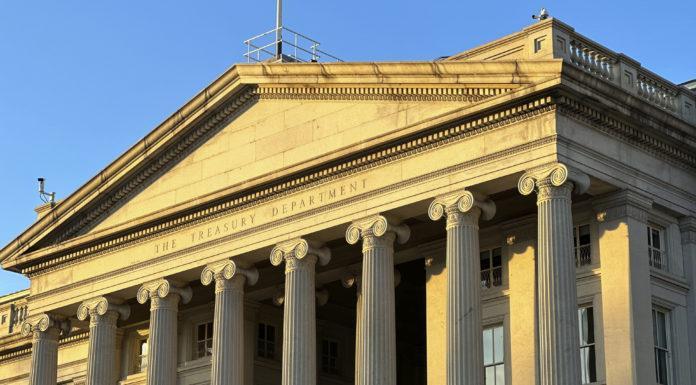(Bethany Blankley, The Center Square) The U.S. began adding $1 trillion worth of debt about every three months beginning last June, a Bank of America investment strategist Michael Hartnett first pointed out in an investment note published last week.
The national debt is currently $34.48 trillion and rising. It surpassed $34 trillion for the first time in U.S. history on Jan. 4.
Three months prior, the debt first reached $33 trillion on Sept. 15, 2023. Three months prior to that, it first reached $32 trillion on June 15, 2023.
“The national debt is the amount of money the federal government has borrowed to cover the outstanding balance of expenses incurred over time,” the Treasury Department explained.
“Simply put, the national debt is similar to a person using a credit card for purchases and not paying off the full balance each month,” it said. “The cost of purchases exceeding the amount paid off represents a deficit, while accumulated deficits over time represents a person’s overall debt.”
The national deficit is $531.86 billion fiscal year to date.
“Compared to the national deficit of $460 billion for the same period last year (Oct 2022 – Jan 2023), our national deficit has increased by $72 billion,” the federal agency tasked with U.S. fiduciary responsibility stated.
Hartnett predicts a 100-day pattern will continue, with the national debt reaching $35 trillion this month, as CNBC first reported.
Last November, Moody’s Investors Service lowered the U.S. federal government’s credit ratings from “stable” to “negative” citing the national debt and growing budget deficit. When announcing the downgrade, it said, “In the context of higher interest rates, without effective fiscal policy measures to reduce government spending or increase revenues, Moody’s expects that the US’ fiscal deficits will remain very large, significantly weakening debt affordability.”
Fitch also cut the U.S. government’s credit rating last year from AAA to AA+, citing “fiscal deterioration over the next three years.”
At the time, Deputy Secretary of the Treasury Wally Adeyemo pushed back, saying, “The American economy remains strong, and Treasury securities are the world’s preeminent safe and liquid asset.”
But by the beginning of 2024, economists and CEOs had already begun warning that a recession is on the way due to high interest rates “killing companies,” massive layoffs, and a jobs report that indicates more people are working part-time jobs, including multiple part-time jobs, to make ends meet.
The economic warnings come as food stamp costs for family meals increased 31% over the past three years, and car insurance rates increased 26% nationally, with some states reporting 44% increases in one year, The Center Square has reported. To combat hard economic times, one CEO recommended Americans eat cereal for dinner, The Center Square also reported.
Federal Reserve Chairman Jerome Powell is scheduled to testify this week before the House Financial Services and Senate Banking committees to address ongoing financial concerns and the Fed’s outlook and proposed solutions. The Fed is also expected to cut interest rates this month, some analysts have predicted.

